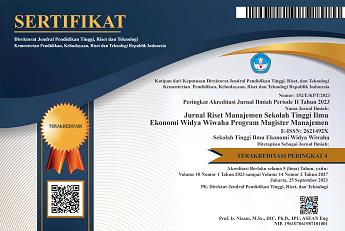PENGARUH REWARD EKSTRINSIK & INTRINSIK TERHADAP KINERJA DENGAN KEPUASAN KERJA SEBAGAI VARIABEL INTERVENING
DOI:
https://doi.org/10.32477/jrm.v3i1.77Keywords:
Reward extrinsic, intrinsic rewards, job satisfaction, Employee PerformanceAbstract
This study is concerned with how the effect of extrinsic and intrinsic reward to performance and job satisfaction as an intervening variable. The purpose of this study was to determine the effect of reward extrinsic and intrinsic job satisfaction and performance either partially or simultaneously, determine the effect of job satisfaction on performance as well as find out more where the effect directly reward extrinsic and intrinsic to the performance of employees with indirect influence reward extrinsic and intrinsic rewards to employee performance. Respondents of this study consist of 100 employees. The employed data of this study are primary data. The data is collected by distributing questionnaires to respondents. The data is analyzed by regression analysis and path.The results show that partially or simultaneously reward extrinsic and intrinsic are significant positive effect on job satisfaction and performance. There are positive and significant impact on job satisfaction toward employees performance as well as an indirect effect (reward extrinsic and intrinsic to the performance of employees through job satisfaction) greater than a direct effect (extrinsic and intrinsic reward to employees performance)
References
Aisyah, Mimin Nur (2006), “Strategi dan Kinerja dalam Sistem Kompensasi”, Jurnal Pendidikan Akuntansi Indonesia, Vol.5, No.2.
Aktar, Serena, Muhammad Kamruzzaman Sachu, and Md. Emran Ali (2012), “The Impact of Rewards on Employee Performance in Commercial Banks of Bangladesh: An Empirical Study”, Journal of Business and Management, Volume 6, Issue 2 (Nov. - Dec.), PP 09-15
Allen, R.S., & Kilmann, R.H. (2001), “The Role of the Reward System for a Total Quality Management Based Strategy”, Journal of Organizational Change Management, 14 (2), 110-127.
Azwar, Saifuddin (2009), Metode Penelitian Cetakan Ketiga, Yogyakarta: Pustaka Pelajar
Byars and Rue (2000), Human Resource Management: A Practical Approach, New York: Harcourt Brace
Dessler, Gary (2006), Manajemen Sumber Daya Manusia, Edisi Kesepuluh, Jilid 1.Terj. Jakarta: Indeks
Edirisooriya, Waruni Ayesha (2014),” Impact of Rewards on Employee Performance: With Special Reference to ElectriCo”, ICME, Proceedings of the 3rd International Conference on Management and Economics, Faculty of Management and Finance, University of Ruhuna, Sri Lanka, Page 13
Fareed, Zezhan, Zain Ul Abidan, Farrukh Shahzad, Umm-e-Amen, and Rab Nawaz Lodhi (2013), “The Impact of Rewards on Employee’s Job Performance and Job Satisfaction”, Academy of Business & Scientific Research. Page 1.
Gohari, Payam; Ahmadloo, Akram; Boroujeni, Majid Bakhtiari; Hosseinipour, Seyed Jafar. (2013), “The Relationship Between Rewards and Employee Performance”, Institute of Interdisciplinary Business Research, Vol.5. No.3.
Ghozali, Imam (2005), Aplikasi Analisis Multivariate dengan Program SPSS. Semarang: Badan Penerbit Universitas Diponegoro.
Handoko, Hani (2012), Manajemen Sumber Daya Manusia. Yogyakarta : BPFE
Honig-Haftel, S. & Martin, L.R. (1993),”The Effectiveness of Reward Systems on Innovative Output: An Empirical Analysis”, Small Business Economics, 261-269.
Javed Muhammad, Muhammad Rafiq, Mustajab Khan, dan Maqsood Ahmed (2012), “Effect of Rewards on Job Satisfaction Evidence from Pakistan”, Interdisciplinary Journal of Contemporary Research in Business, Vol.4. No.1,Page 1.
Khan, I., Shahid , M., Nawab, S & Wali, KK (2013), “Influence Of Intrinsic And Extrinsic Rewards On Employee Performance: The Banking Sector Of Pakistan”, Academic Research International, Vol. 4 No. 1, Page 282.
Koencoro Galih Dwi, Mochammad AL Musadieq, dan Heru Susilo (2014), “Pengaruh Reward dan Punishment Terhadap Kinerja”, Skripsi S1 Universitas Brawijaya. Hal, 1.
Mahaney, R. C.& Lederer, A.L. (2006), “The Effect of Intrinsic and Extrinsic Rewards for Developers on Information Systems Project Success,” Project Management Journal, 37 (4), 42-54.
Mangkunegara, AA. A. P. (2005), Evaluasi Kinerja, Bandung: Refika Aditama.
Nugroho, Bambang (2006), Reward dan Punishment, Buletin Cipta Karya, Departemen Pekerjaan Umum.
Özutku, Hatice (2012), “The Influence of Intrinsic and Extrinsic Rewards on Employee Results: An Empirical Analysis in Turkish Manufacturing Industry”, Business and Economics Research Journal, Volume 3, Number 3, pp. 29-48.
Platis, Ch., Reklitis, P. & Zimeras, S. (2014), “Relation Between Job Satisfaction and Job Performance in Healthcare Services”, International Conference on Strategic Innovative Marketing, IC-SIM 2014, September 1- 4.
Pushpakumari.M.D. (2008), The Impact of Job Satisfaction on Job Performance :An Empirical Analysis, http://wwwbiz.meijou . a c . j p / S E BM/ r o n s o / n o 9 _ 1 / 08_Pushpakumari.pdf, Page 92
Rivai Veithzal dan Ella Jauvani Sagala (2009), Manajemen Sumber Daya Manusia untuk Perusahaan dari Teori ke Praktek, Jakarta: PT. Raja Grafindo
Simamora, Henry (2006), Manajemen Sumber Daya Manusia, Edisi 2, Yogyakarta: STIE YKPN.
Sugiyono (2005), Statistika untuk Penelitian, Bandung: Alfabeta
Sugiyono ( 2007), Metode Penelitian Kuantitatif, Kualitatif, dan R & D, Bandung: Alfabeta.
Wahab, Burhanuddin Rahmatulla (2012), “Pengaruh Kepuasan Kerja dan Motivasi Kerja Terhadap Kinerja Karyawan”, Skripsi S1 tidak diterbitkan, Universitas Hasanudin
Zhou, Y., Zhang, Y., & Montoro-Sánchez, Á. (2011).” Utilitarianism or Romanticism: The Effect of Rewards on Employees Innovative Behaviour”, International Journal of Manpower, 32(1), 81-98.









